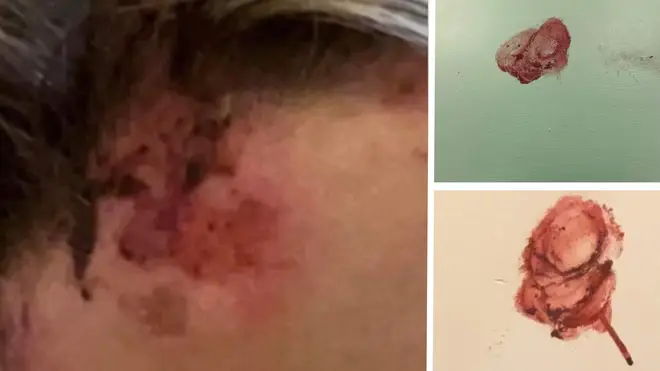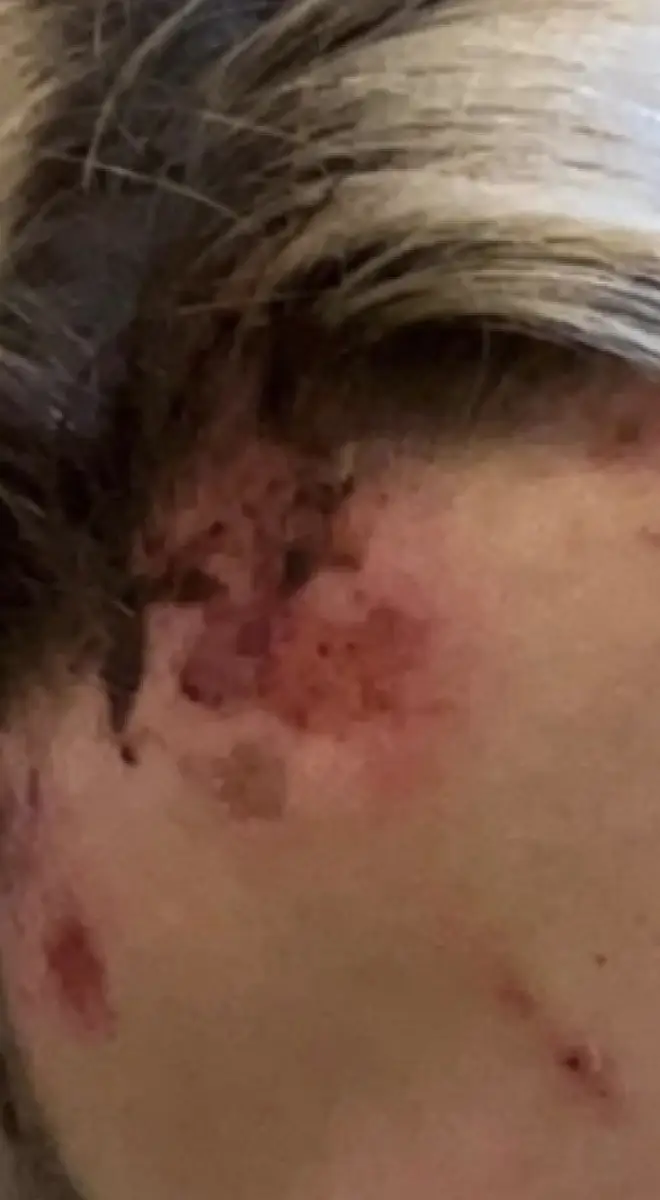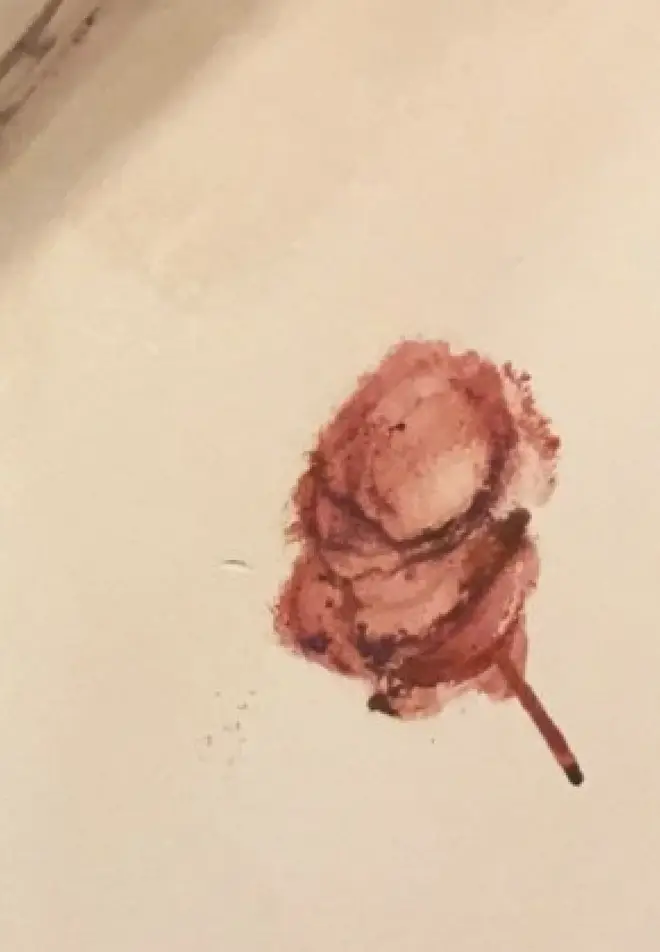
Tom Swarbrick 4pm - 7pm
25 November 2022, 09:20 | Updated: 25 November 2022, 11:21
WARNING contains distressing images

A desperate father has told LBC he fears his daughter could die, as she is left to repeatedly self harm in a hospital run by a scandal-hit NHS trust, where failings led to the tragic deaths of three teenage girls.
The heart-breaking allegations are chillingly similar to the cases of Christie Harnett, 17, Nadia Sharif, 17, and Emily Moore, 18, who were able to harm themselves before taking their own lives in the care of the Tees, Esk and Wear Valley NHS Trust in County Durham.
The father claims his daughter is left for up to six hours to bang her head at Lanchester Road Hospital in County Durham, where Ms Moore took her own life in February 2020 following several failings.
A staff member has also been accused of falling asleep on "line of sight" duty, where they are supposed to watch patients to ensure their safety.
LBC has been sent an image, said to have been taken in June 2020, although the Trust say there is no record of the incident.

The mental health unit is operated by the disgraced Tees, Esk and Wear Valley NHS Trust, where earlier this month, a damning investigation found "multifaceted and systemic" failures had led to the deaths of three teenagers, including 18-year-old Emily Moore, who took her own life in Lanchester Road.
Christie Harnett and Nadia Sharif, all 17, also died in the nearby West Lane Hospital in Middlesbrough, where Emily had previously been a patient.

A review published on November 2, found all three girls were able to self harm and attempt suicide due to a catalogue of failings, including understaffed wards and inadequate assessment of risks.
There are now fears those failings are continuing after the father of a patient at Lanchester Road, who's identity we are protecting, told LBC his daughter is "left for hours on end to bang her head".
He said: "She's just left basically all day with no interaction with staff whatsoever. When she does have incidents and she's banging her head or self harming, she is left for hours on end to literally bang her head.
"It's not just one or two minutes - it could be two to six hours."
His daughter, now in her early 20's, was first sectioned at the age of 13 and was previously in the care of the Trust's Child and Adolescent Mental Health Services.
Read more: NHS doctor told junior GP she 'looked like Beyonce' and insisted on rating her work clothes
Read more: One in five NHS trusts branded ‘red’ for baby death rates
He told LBC: "It's heart-rendering to go and visit your daughter and all of a sudden there are marks, lumps and bruises on her head."
When asked what he thought would happen if this was allowed to continue, he said: "the way things are - and I know it's horrible to say - it can be death.
"I'm really scared for other children going in to these places, and for my own daughter. I just don't think they will ever change the way they do things in the NHS".
His daughter was admitted to the hospital in August and official complaints have been raised about her care. But he claims no action has been taken as a result.
He told LBC: "It never seems to go any further, it just doesn't. I don't know why. The hospital turn around and say 'sorry' and that tends to be alright for them, but it isn't alright. It's been proven by the three families who have lost their daughters - it's not alright."
The hospital has been rated as 'requires improvement' by the Care Quality Commission, who are currently undertaking another inspection.

In October the CQC found wards caring for adults with autism and learning difficulties at Lanchester Road Hospital were inadequate.
Emily Moore, 18, took her life in a bathroom on an adult ward at Lanchester Road Hospital in February 2020, and the review in to the circumstances surrounding her death found a failure to address ligature risks in her accommodation.
It also revealed her parents concerns had been ignored and complaints were not investigated.
Emily's father David Moore told LBC the Trust risks "losing another life."
He said: "Nothing seems to improve at all. It's cruel and inhumane - it shouldn't be happening in a place of compare and compassion. It needs to stop and it needs to stop now."
Mr Moore said the case highlighted by LBC is similar to his daughter's and "a few years on, things haven't changed at all. She is still being harmed when she's supposed to have care. She's still being, for want of a better word, abused. It shouldn't happen in a hospital. Tees Esk and Wear Valley need to do something about it now, there's no tomorrow - it's now. Or you'll lose another life."
In response to the findings of the reports, Brent Kilmurray, chief executive of Tees, Esk and Wear Valleys NHS Foundation Trust, said: “On behalf of the trust, I would like to apologise unreservedly for the unacceptable failings in the care of Christie, Nadia and Emily which these reports have clearly identified.
“The girls and their families deserved better while under our care. I know everyone at the trust offers their heartfelt sympathies and condolences to the girls’ family and friends for their tragic loss.
“We must do everything in our power to ensure these failings can never be repeated.
“However, we know that our actions must match our words. We accept in full the recommendations made in the reports – in fact the overwhelming majority of them have already been addressed by us where applicable to our services.”
In response to concerns highlighted by LBC a spokesperson for Tees, Esk and Wear Valleys NHS Foundation Trust, said: “We are committed to listening to patients, families and carers from the first time they come into contact with the Trust – to work alongside them to create a positive relationship and support their loved ones care.
“We develop personalised care plans, together with patients and their families, focusing on the needs of the individual and using evidence based practice. This includes working with patients to understand why they may self-harm and then finding the best way to support them in the least restrictive way possible.
“We would encourage the family to get in touch and talk to the care team about the concerns they have raised.”
If you are affected by any of the issues in this story you can call 116 123 to talk to Samaritans, or email: jo@samaritans.org for a reply within 24 hours
Text "SHOUT" to 85258 to contact the Shout Crisis Text Line, or text "YM" if you're under 19
If you're under 19, you can also call 0800 1111 to talk to Childline. The number will not appear on your phone bill.